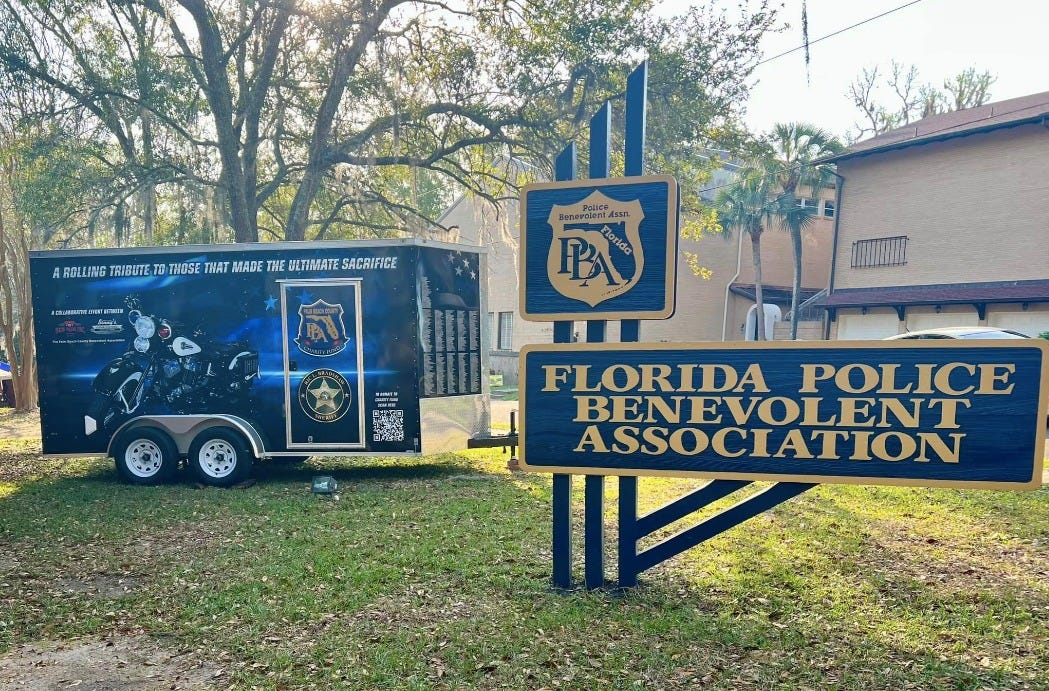Florida advances bills to roll back child labor laws and prohibit police oversight boards
This week, Keep Track takes a look at a selection of bills under consideration by the Florida legislature. The Sunshine State, controlled by an increasingly extreme Republican trifecta, has been a testing ground for legislation that chips away at constitutional and civil rights. Bills that become law and survive subsequent legal challenges are often copied by other red states—like the “Don’t Say Gay” law, which was duplicated and introduced in at least 20 other states. Due to its potential to influence conservative politics across the nation, Florida is one of the most important states to watch. So far, just over a month into 2024’s legislative session, the state is on the verge of rolling back child labor laws, erasing transgender people from public life, and removing oversight of law enforcement agencies.
Child labor
The Florida legislature is currently considering three bills that weaken many of the state’s child labor laws. The first, HB 49, would allow 16- and 17-year-olds to work more than 30 hours and six straight days when school is in session. The bill, written by the conservative advocacy group Foundation for Government Accountability, would also remove the requirement that minors receive a meal break for every 4 hours on the job. A state lobbying group for the hospitality industry, called the Florida Restaurant and Lodging Association, “strongly supports” the bill.
The second, SB 1596, would limit 16- and 17-year-olds to working no more than 30 hours a week when school is in session, but would allow them to work as late as midnight before a school day.
The third, SB 460, would allow 16- and 17-year-olds to work on roofs, scaffolding, and construction sites, provided that the teen obtained an OSHA certificate and is under direct supervision. The Associated Builders and Contractors and Florida Home Builders Association drafted the bill and sent it to Sen. Corey Simon (R-Tallahassee), who filed it for the 2024 session.
Anti-LGBTQ
HB 599: Expands “Don’t Say Gay'' policies to include government workplaces and nonprofits by prohibiting transgender and nonbinary employees from providing preferred personal pronouns to employers. It would also ban any tax-exempt nonprofit from requiring “any training, instruction, or other activity on sexual orientation, gender identity, or gender expression,” a prohibition that could potentially cause many Florida LGBTQ+ programs to shut down.
HB 1233: Deemed the “trans-erasure bill” by the ACLU, this legislation would require every person applying for a new or renewal driver’s license or identification card to sign an affidavit certifying that the sex listed on the application matches the sex on their original birth certificate. If the sex does not match, the bill requires the Department of Motor Vehicles to revoke the card/license. Additionally, HB 1233 mandates that insurance companies that cover gender-affirming care must also provide coverage for detransition treatment and conversion therapy.
Note that this bill, if it becomes law, would assist the state in creating a list of transgender individuals by cross-referencing the affidavits with previous gender markers on driver’s licenses.
Last month, the Florida Department of Highway Safety and Motor Vehicles issued a directive barring transgender residents from changing the listed gender on their driver’s licenses or state ID. The memo states that "misrepresenting one’s gender, understood as sex, on a driver's license constitutes fraud," and those with licenses that list a gender different than their birth sex could be subject to "criminal and civil penalties, including cancellation, suspension, or revocation of his or her driver license."
SB 1708: Prohibits any sheriff department's public safety programs from focusing on “a person’s…sexual orientation,” effectively banning all LGBTQ+ safety programs.
SB 1238: Would further criminalize drag shows and, potentially, books with LGBTQ+ material by classifying such content as “lascivious grooming” when seen or accessed by a person under 16 years old.
SB 1780: Declares that it is defamation to accuse a person of homophobia, transphobia, or discrimination based on sexual orientation/gender and limits the pathways available to prove the truth of such accusations. For example, the bill would allow a person to be sued for defamation if they accuse someone of transphobic discrimination when it is the latter person’s “religious expression or belief” that it is a sin to be LGBTQ+.
If passed and signed into law, this legislation will likely be judged unconstitutional for punishing free speech. As The Guardian notes, SB 1780 and similar bills are created to “test the waters and see how far, legally, lawmakers can go until they are able to silence detractors.”
Abortion
HB 651: Changes the state’s civil liability law to allow the parents of an unborn child to file a wrongful death lawsuit. While the legislation specifies that a wrongful death action for the death of an unborn child cannot be brought against the mother, activists worry that it would allow a father to sue doctors for performing an abortion without his approval. Democrats tried to amend the bill last month to protect abortion providers, but the Republican majority voted it down.
Another change that [Laura] Goodhue [of the Florida Alliance of Planned Parenthood Affiliates] said could help address concerns would be to amend the text to only allow the pregnant person to file a wrongful death claim. “That eliminates the father who could be an abuser or a rapist or what have you from holding additional power over that person,” Goodhue said.
HB 1519: Removes the rape and incest exception for abortions performed within the time frame of the state’s 15-week ban and makes it illegal for someone outside of the state to mail abortion medication to a Florida resident.
Meanwhile, the Florida effort to get an amendment on the November ballot protecting the right to pre-viability abortion obtained the required number of signatures last month. However, the state Supreme Court could still disqualify the amendment if the judges (all Republican) determine that the proposed amendment’s language is unclear.
Labor and public officials
HB 1471: Meant to fix the unintended effects of last year’s anti-union law, which required public sector unions to represent at least 60% of employees to maintain certification and prohibited public sector unions from deducting dues directly from paychecks. HB 1471 would expand the current law’s exemption for police, firefighter, and correctional officer unions to include paramedics, EMTs, and 911 dispatchers (often represented by the law enforcement and firefighter unions). It would also remove the requirement that all public sector unions submit annual financial reports audited by a certified public accountant (CPA), instead only mandating that a CPA “prepare” the reports. Both changes were motivated by complaints from police and firefighter unions.
Additionally, HB 1471 adds more onerous reporting requirements to public sector unions and makes it easier for the Florida Public Employees Relations Commission (led by a DeSantis appointee) to revoke the certification of unions.
SB 7014: Further weakens the state’s ethics commission by only allowing the panel to launch an investigation if there is a signed and sworn complaint from someone who possesses "personal knowledge" of a potential violation. In other words, anonymous tips or information uncovered by the media would no longer be enough for the Florida State Commission of Ethics to initiate an investigation. SB 7014 then applies the same standards to local ethics offices, making it more difficult for cities and counties to fight corruption.
SB 7014 continues DeSantis’ attack on ethics organizations after the Governor appointed Tina Descovich, a co-founder of Moms for Liberty, to the Florida Ethics Commission last fall.
Police
HB 601: Would ban local governments from creating civilian police oversight committees and eliminate the approximately 20 existing across the state. Civilian oversight boards independently investigate misconduct allegations and make policy recommendations to improve police department functions, ethics, and community relations.
HB 1605: Allows police departments across the state to keep the names of officers involved in fatal shootings secret for five years by classifying the officers as “crime victims.” Follows a state Supreme Court ruling last year that Marsy’s Law, an amendment to the state constitution that granted more rights to crime victims, “guarantees to no victim — police officer or otherwise — the categorical right to withhold his or her name from disclosure.”
HB 1657: Removes a prohibition on police officers using force “if the arrest or execution of a legal duty is unlawful and known by him or her to be unlawful.” It also clarifies that a person “is not justified in the use or threatened use of force” to resist an “unlawful arrest or detention by a law enforcement officer.” If a person causes the death of an officer, even during an unlawful arrest, and is found guilty of manslaughter, HB 1657 increases the sentence to mandatory life without parole.
SB 184: Makes it illegal to remain within 14 feet of a first responder (including police officers) after being given a warning, with the intent of causing “substantial emotional distress in that first responder.” As Abdelilah Skhir of the ACLU of Florida pointed out, the vagueness of what constitutes “emotional distress" could be used to prevent people from recording police interactions with the public.
Other
HB 87: Allows Florida citizens to shoot and kill black bears to “protect [themselves] or [their] private property” without investigation from the state’s Fish and Wildlife Conservation Commission. According to the bill’s author, Rep. Jason Shoaf (R), the bill is necessary due to bears “that are on crack…standing in your living room growling and tearing your house apart.”
SB 1044: Allows school districts to bring in volunteer chaplains to counsel students.
SB 7050: Created in case Florida voters approve of the recreational marijuana initiative in November to limit flower products to 30% THC and vapable/concentrate products to 60% THC. Edibles would likewise be limited to no more than 200mg of THC.







